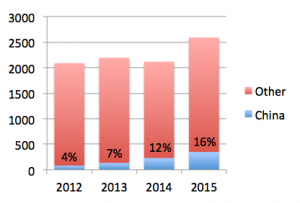Two weeks ago, I embarked onto a road trip to China with the aim to meet Xen Project users as well as contributors. I visited a number of vendors in Hangzhou and Beijing on this trip. Part of the objective was to give training to new contributors and developers, and to strengthen existing relationships.
What is remarkable, is that many of the latest contributors to the project have only recently graduated from University (in 2014 or 2015). Working with the Xen Project and Linux was often their first experience with open source. Working with open source projects is not always easy, in particular when doing so in a non-native language and with a manager behind you, who expects that you get a feature into an open source project by a certain time. In addition, as a community we need to balance the needs of different stake-holders (enterprise, cloud, embedded, security companies) and make informed decisions on the relative importance of new features vs. quality vs. security vs. … which has led to increasingly strict criteria and more and more scrutiny, when reviewing code contributions. This means, that contributing to the project for the first time can sometimes feel like a real challenge. Part of the reason why I regularly travel to China, is to explain what is happening in the community, to explain that all members of the community can influence and shape how the project is run and to understand local community issues and address them as they occur.
Contributor Training v2
Since the creation of the training material last autumn, there have been a few changes in how the project operates. Most notably in the Security Vulnerability Management Process and Release Management. Many other areas of how the project operates are also being reviewed and discussed. The goals behind these discussions and proposed changes intend …
- to make the communities’ development processes more efficient and scalable.
- to make conscious decisions about trade-offs, such ease of feature contribution vs. quality and security.
- to make it easier for newcomers to join the project.
- to encourage more contributors to review other people’s code, test our software, write test code and make other non-code contributions to the project.
Thus, I updated our training material to reflect these changes and added new material. It is divided into 4 separate modules, each of which takes approximately 2.5 hours to deliver. The training decks are designed as reference material for self-study. Each training module has many examples and embedded links in it. The material is available from our Developer Intro Portal as slides or as PDFs. I embedded the updated and new training modules into this blog for your convenience:
If you have any questions, feel free to ask by contacting me via community dot manager at xenproject dot org and I will improve the material based on feedback. My plan is to keep the training material up-to-date and to modify it as new questions and new challenges arise.

